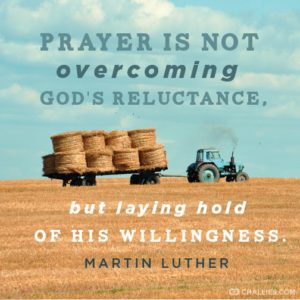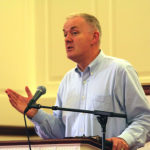 Article: Tim Challies – A Powerful Practice for Prayer (original source here)
Article: Tim Challies – A Powerful Practice for Prayer (original source here)
Prayer has always been a struggle for me, and I know I am not the only one. There’s a reason that books on prayer continue to flood our bookshelves. Very few of us pray as often and as earnestly as we would like. Very few of us are confident that we pray well. Fewer still feel like we really get prayer.
I have read the books and sat in the seminars and heard the sermons and even preached a few of my own. Along the way I have learned many truths and picked up many practical tips. Little by little, bit by bit, they have helped me grow in my knowledge and understanding of prayer. And, I trust, they have helped me to actually pray.
There is one practice I find myself working on these days more than any other, and I think it may be the most important of them all. It is a simple one: Never resist the least urge to pray.
I cannot remember where I first heard that. Was it Joel Beeke? Was it Martyn Lloyd-Jones? Was it a Puritan writer? It may well have been all of them. The truth behind it is simple: It’s never the wrong time to pray. Those impulses are invariably good. After all, it’s not like Satan or the old man will be the ones directing me to call out to God rather than resting in selfishness or self-reliance, is it?
Like me, you probably feel that urge to pray throughout your day. You feel it after church when you are speaking to a struggling friend. Something in your mind says, “I should pause right here and right now and pray with her.” And you fight a momentary battle over whether or not you will actually say, “Let me pray for you.”
You feel it when you are lying in bed beside your wife, you are about to go to sleep, and you think, “I should pray with her.” But even something so simple can feel like the hardest thing in the world.
You feel it when you are sharing the gospel. He has been at least a little bit receptive and you think, “I should offer to pray for him.” And right there, a whole cosmic battle rages within your heart and mind.
It happens just as often when you are alone and you are struck with the desire to pray or the impulse that you ought to pray. You see that you have the opportunity to pray. You believe that this is the time to pray. But will you pray?
Never resist the least urge to pray. What if you lived that way? What if we all lived that way? Our lives and our churches would be bathed in prayer. I believe we would be living in much greater faithfulness to God’s command to “pray without ceasing” (1 Thessalonians 5:17).
So why don’t you try it? See what difference it makes in your life, in your family, in your church, when you stop resisting those urges to pray, and when you joyfully respond to every impulse.
It turns out, by the way, that it was probably Martyn Lloyd-Jones I was reading. He gives the instruction in the context of sermon preparation, but it applies equally to all of life:
Always respond to every impulse to pray. I would make an absolute law of this – always obey such an impulse.
Where does it come from? It is the work of the Holy Spirit; it is a part of the meaning of ‘Work out your salvation with fear and trembling, for it is God which worketh in you both to will and to do of his good pleasure’ (Phil 2:12-13).
This often leads to some of the most remarkable experiences in the life of the minister. So never resist it, never postpone it, never push it aside because you are busy. Give yourself to it, yield to it; and you will find not only that you have not been wasting time with respect to the matter with which you are dealing but that actually it has helped you greatly in that respect…
Such a call to prayer must never be regarded as a distraction; always respond to it immediately, and thank God if it happens to you frequently.


